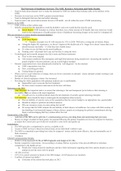Study guide
Provision of Healthcare- NHS
- Course
- Institution
- Book
20 pages worth of notes containing lecture notes, summary of academic literature and relevant case law and legislation. Considers resource allocation in the NHS, with a particular focus on scarcity and rationing strategies [and the legal and ethical implications of them].
[Show more]





